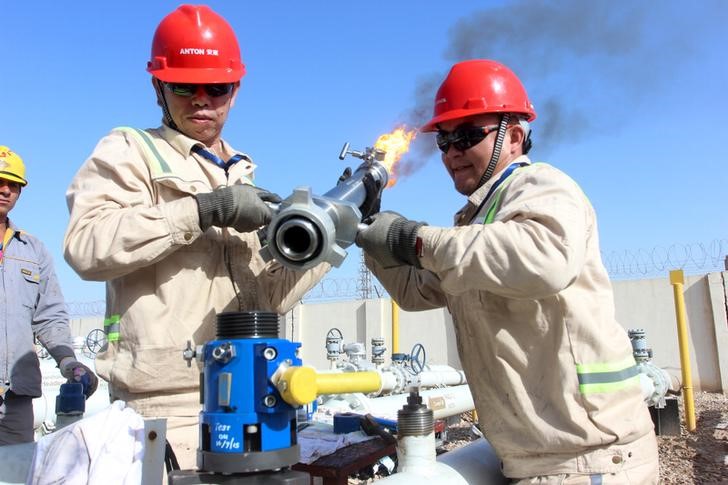(Repeats story with no changes to text)
By Nia Williams
CALGARY, Alberta, June 22 (Reuters) - Alejandro Rodriguez
wants to be a sommelier. His previous experience: 20 years as an
oil reservoir engineer.
The 42-year-old needed to consider a career plan B after ARC
Resources Ltd ARX.TO laid him off in January, adding to a
growing number of people in the Canadian city of Calgary,
Alberta who no longer have a place in its once-vibrant oil and
gas industry.
Once lured by high pay and a multitude of opportunities,
many job seekers in Calgary often have one mission these days:
get out of the industry and never return.
"I see this as an opportunity to go for the passions you may
have. If the downturn had not come, I would be continuing in the
oil and gas industry," said Rodriguez.
While the oil-rich province has a long boom and bust
history, executive recruiters say pessimism is deeper than in
past, with a growing number of white-collar workers looking for
more stable careers.
In May, there were 25,000 fewer jobs in Calgary than there
were a year earlier. Unemployment hit 8.1 percent, according to
Statistics Canada data, higher than the 7.8 percent unemployment
seen across Alberta, which has nearly doubled from 4.6 percent
two years earlier.
Those departures suggest the industry could forever lose
some of the talent and expertise it would need during a
recovery.
"We have people coming through our programs saying 'We are
done. We do not want oil and gas jobs any more because it's too
unstable'," said Jackie Rafter, founder of Higher Landings, a
company that tries to help people move into different careers.
With U.S. crude around $48 a barrel, less than half the
price it was two years ago, industry veterans call this slump
the worst in a generation. Last month's wildfire in the northern
Alberta oil sands region landed a cruel extra blow.
The Canadian industry's shift to produce more higher cost
oil sands crude also makes a recovery less likely in a low-price
environment. Research firm Wood Mackenzie recently estimated new
thermal oil sands projects would need a U.S. crude price of
around $60 to break even over time.
"DO I WANT TO GO THROUGH THIS AGAIN?"
That means there is plenty of demand for Rafter's company,
which held a recent workshop in a small, windowless conference
room on the 52nd floor of Calgary's Suncor Energy tower.
During the hour-long bring-your-own-lunch session, attendees
are urged to focus on their values, beliefs and identity, as
well as skills. She urges attendees to "unpeel the onion," to
figure out what kind of career would work for them.
But she warns those that think they can land another oil and
gas job they are in for a shock since jobs that were once
plentiful are now hard to come by.
"I feel sorry for those people who expect to get another job
doing what they were doing before," she said.
Wayne Beatty, 61, former vice president of corporate
development at oil sands producer Southern Pacific Resource
Corp, which went bust last year, is working toward provincial
insurance and mutual fund licenses for a new career in financial
services.
"The swings (in oil and gas) are much bigger than what other
industries have seen and that creates all sorts of havoc," he
said.
Rafter said other Higher Landing clients include an engineer
who has joined an accounting firm, a former oil company
accountant turned nutritionist, and an oilfield services human
resources manager who now works for a construction firm.
Bruce Proctor, managing partner of executive recruiter
Summit Search Group in Calgary, said oil and gas professionals
who have been laid off for six months or longer often then take
a hard look at their options.
They ask, "'do I want to go through this again once the
industry comes back in another three to five years?'" he said.
CASUALTIES
There is another problem for Calgary's job seekers. Some
prospective employers worry oil veterans might return to their
old, lucrative jobs if prices recover.
Summit Search Group's Proctor said many of his clients worry
that former energy sector workers use other jobs -- which often
have lower status and pay -- as stopgaps for tough times, so
they won't consider oil and gas "casualties" for jobs now.
David Elsey, vice president at recruiter Executrade, said
many companies have been burned in the past by hiring oil and
gas workers, only to see them jump ship as soon as a new posting
in the sector came available.
"It's a nightmare from a recruitment perspective, you have
such skilled people and can't do anything with them," he said.
Marian Hanna, who said she is in her 50s, lost her job as
president of ION Geophysical Canada IO.N last July when the
geoscience firm closed its Calgary office.
She recently completed a corporate directors designation
program, similar to an executive MBA, run out of the city's
Haskayne School of Business, and is the current president of the
Canadian Society of Exploration Geophysicists.
While the title is impressive, it does her little good these
days because good job opportunities are so scarce, she said.
"If push comes to shove... I may be in retail or a Walmart (NYSE:WMT)
greeter. I am not trying to be negative, but that's the
reality," she said. "With 100,000 people out of work you can
imagine how many apply when there's an opportunity."
<^^^^^^^^^^^^^^^^^^^^^^^^^^^^^^^^^^^^^^^^^^^^^^^^^^^^^^^^^^^
Oil's impact on Alberta's unemployment rate http://tmsnrt.rs/28MupyQ
^^^^^^^^^^^^^^^^^^^^^^^^^^^^^^^^^^^^^^^^^^^^^^^^^^^^^^^^^^^>
(Editing by Robert MacMillan and Alan Crosby)
